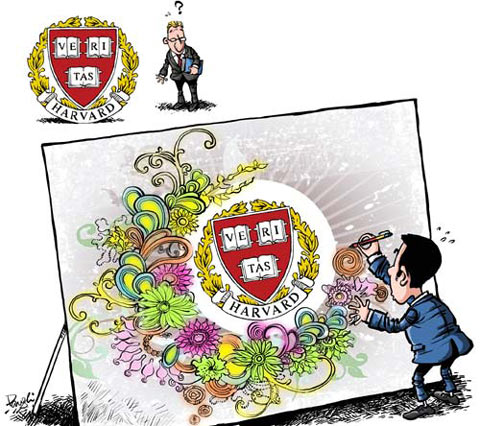
|
An outsider's perspective is valuable. But even in this age of instant information the outsider could become a poster boy made malleable by preconceived perceptions and a thirst for contrast. In the minds of most Chinese, the word "Harvard" is synonymous with educational excellence - to the point of overshadowing other equally top-notch Western institutions of higher education except maybe Oxford and Cambridge. However, the Harvard in the Chinese imagination is not the Harvard by the Charles River in Boston. It is a myth shrouded in layers of cultural misperception. When I was a kid, a friend of my father's, one of the very few who had been to other provinces of the country, described Harvard as a school with very high walls, where students were not allowed to go outside during the four years of their study, not even when their parents died. They had to memorize tons of text from early morning until late at night. Now that I recall it, the Harvard believed in by this relatively well-informed person (for that era) was a cross between an ancient Chinese school and a prison. Had he been shown the movie Love Story, which was made around the same time and was about a Harvard student, he would have been devastated: "What? A student could date and get married while in school?" Even with China's opening up and with the growing exchange of information, some Chinese people simply cannot resist the temptation of molding China's favorite foreign university in our own image, which is essentially a school staffed by thousands of tiger moms. Thus were born the rumors about the 20 statements plastered on the walls of Harvard's library. The statements were said to include: "If you sleep now, you will have a dream, but if you study now, you will realize a dream"; "Even though happiness is not based on a person's performance records, success is the likely result"; and "If you study one more hour, you will have a better husband." In 2012, The Wall Street Journal carried an article that quoted Professor Robert Darnton, who stated unequivocally: "As the university librarian, I can attest that no such writings exist on any of the walls at Harvard's 73 libraries." The professor may not know that he has many phantom colleagues who have penned Chinese best-sellers. There is a special section in China's publishing industry, usually operated underground and with retail outlets on sidewalks, that churn out many inspirational and how-to books. They tend to have extremely catchy titles, such as Executive Power, which was supposedly authored by a certain Professor Paul Thomas, who is on the Harvard Business School faculty. After selling 2 million copies, this volume of inspiration, which was said to be President Lincoln's favorite book, was found to be totally phony. There was no English original and Paul Thomas was a name the publisher created out of the blue. Harvard Mottos is another such book, but its author seems to have more flesh and blood than Paul Thomas of Executive Power. Danny Feng is reported to be a Beijinger who has studied in the United States. After the scam was exposed, Feng said he based his book on an online post by expanding on each of the 20 mottos. It was a fly-by-night operation, taking only two months from the book's conception to hitting store shelves. The trend can be traced back to 2000 when Liu Yiting, the Harvard Girl was published. Liu's mother, Liu Weihua, wrote a book chronicling her methodology of teaching her daughter that ended up with the younger Liu being admitted into Harvard's undergraduate program. The book sold a cumulative 2 million copies and spawned another book of rebuttal. In Truth, Xiao Yu wrote that the way Liu was trained, as described in her mother's book, is traditionally Chinese rather than Western. He adds: "The reason the myth has held up is the word Harvard. Most in China do not know the real Harvard and they placed a halo of admiration around it." At least Liu Yiting is a real person who really got into Harvard and her mother really wrote that book. Most of those responsible for the Harvard-related success stories may not even have a college diploma. Many of those inspirational books were hack jobs by those with marketing savvy and whose writing consists mostly of copying and pasting from online sources. My parents did not write books. But they instinctively used comparison as a means of motivating me while I was young. "That kid next door is studying from 5 am to 10 pm," or, "He's got all As, but what have you got?" It dawned on me that my next-door neighbor was actually serving as a kind of miniature Harvard in my parents' pedagogy. But as a real person he posed many inconveniences, especially when he started to flunk his courses. But Harvard is always there, so remote and so impersonal that it can be whatever you need it to be. Chinese websites are overflowing with feel-good pieces of factoids and dubious information. People who are eager to share but are totally ignorant of such concepts as "check and verify" will resend a piece they feel important, which could instantly reach millions, usually depending on how catchy the title is. By the time experts come out to clarify, the damage is done. The clarification piece would at best make a small dent in the colossal machine of myth-making. Misinformation flourishes with issues closest to the hearts of the Chinese people. Education is one. Because many in China are frustrated with the education system, stories from the US are needed as a contrast. Meanwhile, Chinese parents will use the "next-door kid" approach to justify their method of discipline. Likewise, Chinese show their displeasure at official corruption by spreading stories in which foreign bureaucrats were sacked for taking laughably small favors. Mind you, not all of these stories are fabricated a la the Harvard professors' books. Some are true stories distributed by bona fide news organizations. Others have a modicum of truth, but got embellished as they went around. However, they provide a partial picture if not a distorted one. If housing prices in China are obscenely high, those in other countries must be affordable, as attested by comparative photos with prices attached. Never mind that it's ludicrous in the first place to compare an apartment within Beijing's Third Ring Road with a house in Montana. Many people are impatient with stories with context because the subtleties and nuances confuse them, depriving them of the pleasure of drawing simple conclusions. If you say Chinese education has certain advantages that the American way does not, and vice versa, as I have sometimes done, you'll offend both the pro-Chinese-education camp and the opposing camp. Both sides will see you as an enemy. The third party as contrast is a natural development of an earlier trend, which is the third party as confirmation. We used to love this approach, citing foreigners' customary congratulations as testament of the high quality of our artistic works. Just at the turning point when many Chinese awoke to this pitfall, along came Wolfgang Kubin, a German Sinologist who categorically branded Chinese literature as "trash". He grew to be the voice for Chinese discontent with our own literary scene. I suspect that even when he stops critiquing Chinese literature people will make up quotes and attribute to him. If I come up with "20 reasons I hate Chinese literature" and put down Kubin's name, I can guarantee the piece will hit every website in China within a day. By Raymond Zhou ( China Daily ) |
旁观者的观点通常是有益的。但是在这个即时通信的时代,旁观者很可能会成为受先入为主观念和反差欲影响的典型例子。 在很多中国人的心里,“哈佛”就是优秀教育的同义词——甚至超过了除牛津和剑桥之外的同等级西方高校。 然而,中国人想象中的哈佛大学却远远不是波士顿查尔斯河畔的哈佛大学真实的一面。中国人脑海里的哈佛,只是由于文化误解而导致的错误的看法。当我还是一个孩子的时候,我父亲的一个朋友是当时少有的去过其他省份的人。他描述的哈佛大学有着高高的围墙,学生在四年学习中不允许外出,就算父母去世也不行。这些学生必须从早到晚记忆背诵着无数的东西。 现在,当我回忆起这件事的时候,这位相对来说在那个年代还比较有学问的人,他脑海里的哈佛只是古代中国私塾和监狱的融合罢了。有一部名为《爱情故事》的电影拍摄的就是那个时候的哈佛和哈佛学子。如果他看了这部电影的话,一定会大吃一惊:“什么?学生在学校可以约会,还可以结婚?” 就算中国改革开放,与外界的信息交流不断增加,一些中国人还是抵抗不了这些一直以来都是中国人心中最好的国外大学的吸引力,认为那里充满了千千万万个虎妈。有谣言说哈佛图书馆的墙上有20条训言,包括“此刻打盹,你将做梦;此刻学习,你将圆梦”;“幸福或许不排名次,但成功必排名次”;“多学习一个小时,你会找到更好的丈夫”。 2012年,《华尔街日报》刊登了一篇文章,援引了罗伯特·达恩顿教授的一句话,他清楚明白地说:“作为一名大学图书管理员,我敢保证,哈佛73家图书馆的墙上,都没有这样的训言。” 这位教授可能不知道,他有许多“虚幻的”同事写的书是中国畅销书。 中国出版业有一块特殊领域,会大量生产劣质励志和指导书籍,通常秘密印刷,然后在路边摊销售。 这些书通常都会有搏人眼球的书名,例如《执行力》,是所谓哈佛商学院教授保罗·托马斯写的。在售出200万册后,这本据说是林肯总统最喜爱的励志书被发现是假冒伪劣产品。这本书并没有英文原版,保罗·托马斯这个名字也是出版社凭空捏造的。《哈佛训言》也是如此,但是它的作者听起来比保罗·托马斯更有血有肉。丹尼·冯是曾经在美国读书的北京人。在骗局被揭穿之后,冯说他根据网上的20条格言,扩展为一本书。这个不可靠的把戏,使得这本书从发行到畅销只用了2个月的时间。 这种风气可以追溯到2000年《哈佛女孩刘亦婷》的出版。刘亦婷的母亲刘卫华在这本书中记录了她对女儿的教育方法,一直记录到刘亦婷考上哈佛的本科生。这本书累计销量为200万册,还引起了另外一本书的反驳。 事实上,萧愚在书中写道,正如刘亦婷母亲书中所写的,她对刘亦婷的训练是传统的中式的,而非西式的。而且,他说,“这种错误的观念甚嚣尘上的原因是哈佛这个词,许多中国人并不知道真正的哈佛是怎样的,他们在哈佛头上强加了荣誉的光环。” 但是至少刘亦婷是一个真实存在的人物,并且确实进入了哈佛,而且她母亲也确实写了那本书。 许多写了与哈佛相关的成功学书籍的人甚至都没有大学文凭。许多励志书都是由那些洞察市场的人,从网上复制粘贴而搞出来的平庸至极的东西。 我的父母不写书,但是在我小的时候他们会本能地用对比来激励我。“隔壁孩子每天从早上5点学到晚上10点”,或是“人家都得了优秀,你看你得了什么?” 我认识到在我父母的教育法中,邻居家孩子只是哈佛的一个缩小版。但是他作为一个真实存在的人,自己有很多麻烦,特别是不及格的时候。而哈佛永远在那里,那么遥远,无情无欲的,你想让它是什么样子,它就可以是什么样子。 中国网站上充斥着许许多多的看似真实实则虚假的消息。 那些热衷于分享,却又没有查证意识的人经常会转发一些他们认为重要的东西,只要有一个搏人眼球的标题,转发经常会立马达到数百万人次。等到专家出来澄清的时候,危害已经酿就。这些澄清最多能在庞大的造谣机器表面,造成小小的凹陷而已。 虚假信息经常和中国人的生活密切相关,教育就是其中之一。因为很多中国人对教育制度不满,这样,关于美国的教育故事刚好可以拿来做对比。同时,许多中国父母经常会用“别人家孩子”来证明他们的教育方法。相似的,中国人经常会对通过传播一些国外官员因为收取小恩小惠,而被罢免的故事,来表达他们对于中国官员腐败的不满。 提醒一下,并不是所有类似哈佛教授的书都是瞎编乱造的。一些就是由真实的新闻组织发布的真信息。还有一些只有一小部分是真实的,但是随着广泛的传播,不断地被添油加醋。然而,这至少不算完全扭曲事实,只是片面的反映了现实。 如果在一组标有价格的对照图片中,中国的房价高的吓人,而外国的房价还在人们的承受范围之内,那么不要惊讶,这一定是在可笑地将蒙大拿的房子和北京三环的公寓所比较。 许多人都没有耐心看带有文字的东西,因为那些细微的差别会把他们搞糊涂,使得他们丧失了简单下结论的快感。我曾经这样试过,如果你说中国教育有一些美国教育没有的优点,反之亦然,那么你将会把中国教育的支持派和反对派都得罪,双方都会把你当成敌人。 从将第三方当作证实者,到将第三方当作对比,这是自然发展的结果。我们曾经热爱这种方法,将外国人的按惯例的祝贺当作对我们高质量艺术作品的证明。 在这个中国人意识到问题的转折点,沃尔夫冈·顾彬,这位德国汉学家,认为中国文学非常“拙劣”。他逐渐成为表达对中国文学现象不满的人。 我怀疑,当他停止批评中国文学的时候,又会出现很多他的名人名言。如果我想出“我讨厌中国文学的20个理由”,然后标上顾彬的名字,我敢保证,这将会在一天之内成为各大论坛的热点。 (中国日报周黎明 译者 爱吐泡泡小螃蟹 编辑 丹妮) 扫一扫,关注微博微信
  |
